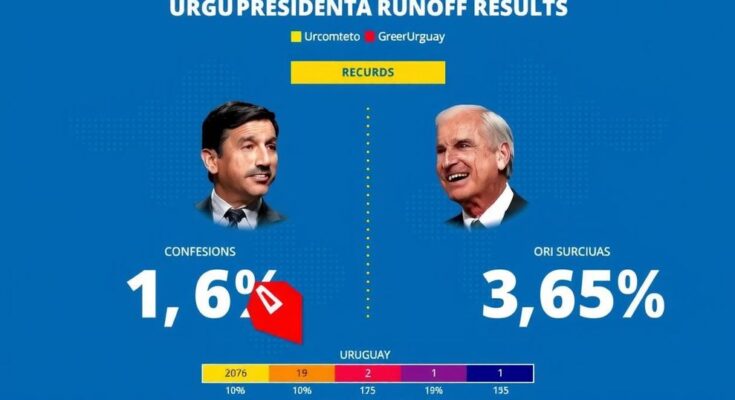Álvaro Delgado, the conservative candidate in Uruguay, conceded to Yamandú Orsi, who won a closely contested presidential runoff. With over half the votes counted, Orsi received 784,523 votes against Delgado’s 771,434. The election reflects a desire for change among voters, with Orsi pledging to address issues like childhood poverty while maintaining moderate economic policies.
In a significant political shift, Álvaro Delgado, the conservative candidate of Uruguay’s ruling coalition, conceded defeat in a closely contested presidential runoff to left-wing challenger Yamandú Orsi on Sunday. With over half of the votes counted, Orsi garnered 784,523 votes to Delgado’s 771,434. The Broad Front, of which Orsi is a member, announced his victory to supporters, indicating a new leadership era after a brief period of right-leaning governance. Orsi’s approach includes a commitment to moderate policies, intending to tackle issues like childhood poverty and organized crime without radical changes to the economic framework established by his predecessors. Former President Luis Lacalle Pou, unable to run again, acknowledged the transition and extended a cooperative spirit to the incoming administration. As part of a global trend, Uruguay’s electorate demonstrated a preference for change, likely influenced by economic grievances and social issues exacerbated during the previous administration’s term.
Uruguay has a long-standing tradition of political stability, characterized by a two-party system and moderate governance. The recent elections reflected a growing discontent with the conservative coalition that had been in power for five years, especially among voters facing economic challenges and rising crime rates. Orsi, previously a teacher and mayor, represents a return to the Broad Front’s policies, known for innovative social reforms and economic growth between 2005 and 2020. His campaign was seen as an attempt to revive former achievements while addressing current dilemmas.
The conclusion of the presidential election marks a notable transition in Uruguay’s political landscape, with Yamandú Orsi set to lead the nation under the banner of the Broad Front. This election underscores a broader trend across the globe as voters express dissatisfaction with incumbent administrations, particularly in the wake of economic instability. Orsi’s approach promises a moderate continuation of previous successful policies while exploring new solutions to persistent challenges.
Original Source: www.pbs.org




